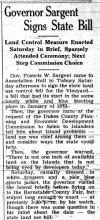The executive director of the Martha’s Vineyard Commission said this week that the regional land use commission will ask the developers for the Meeting House Golf Club project to agree to a three-week extension for the review process.
“The setting and the site are of such a complicated nature that the time frame does not allow us to adjust,” said MVC executive director Charles Clifford. “It is basically to give us a little more time to digest exactly what it is that the applicant has submitted,” he added.
The developers for the golf project are Rosario and Barry Lattuca, a father and son team from Natick, and a Boston real estate development company headed by Richard Friedman, a seasonal Edgartown resident.
“That is fine with us; the commission is working hard and we are not trying to make it hard for them,” Rosario Lattuca said this week when he learned about the imminent request for an extension.
Mr. Clifford said on Wednesday that he was drafting a letter to the developers.
The extension will change the voting deadline for the commission from May 6 to May 29. A public hearing on the golf course development closed early last month. According to its statute, the commission must act on the development within 60 days after the close of the public hearing unless there is an extension.
Planned for some 200 acres of land along the Edgartown Great Pond, the golf course project is under review by the commission as a development of regional impact (DRI). The land is owned by the MacKenty and Bigelow families.
A separate golf club project, planned at the site of the old Vineyard Acres II subdivision in Edgartown, is also under review by the commission as a DRI. A public hearing on that project was expected to close last night.
The Meeting House Golf project has been the subject of heated public debate in the Vineyard community, and among other things, a citizens’ group and legal defense fund has formed to oppose the project because of its planned location along the environmentally sensitive Great Pond. The project, as it is now proposed, also violates the regulations for the Edgartown Ponds District of Critical Planning Concern, a special overlay planning district promulgated through the MVC enabling legislation some years ago. The ponds district regulations prohibit the use of chemical products, including lawn fertilizers and pesticides within 300 feet of the pond, and they also strictly limit the area of turf grass permitted. Five holes for the golf course fall in the pond zone covered by the DCPC regulations. The regulations are enforced by the Edgartown Conservation Commission.
In its 25-year history, the commission has never approved a development project which openly violates DCPC regulations.
Mr. Clifford acknowledged this week that there has been some confusion surrounding the public review process of the Meeting House Golf project, in particular because the developers for the project filed a final statement, literally minutes before the public record closed, which appeared to be a shift in direction for the project.
The final statement claims that the project will now shift into an organic management plan for the golf project, in response to a call for organic turf management standards from an Island conservation group.
“They have changed to an organic system and the commission needs to analyze that,” Mr. Clifford said.
Just how much has changed is still unclear. The final statement submitted by the developers included a list of herbicides, but at a meeting of the MVC land use planning subcommittee early this month the developers for the project said the herbicide list was a mistake and that they now plan to use no herbicides on the golf course. The discussion with the commission subcommittee took place after the public record had closed, and there is no written statement to show that the herbicide list has been deleted.
But at another, subsequent land use planning meeting, committee chairman Michael Donaroma said he will accept the oral statement that no herbicides will be used. “They said it was a mistake and we will believe that,” Mr. Donaroma said.
Mr. Clifford said the exchange was not improper, even though it took place after the record had closed.
“The commission was told an inadvertent chart appeared in the middle of those pages [of the final statement] — it is possible to do that after the record has closed because that is an editorial type of comment,” he said.
Mr. Clifford agreed that it is unclear how much of the golf course management plan has been changed to actually reflect an organic system.
“That is in part what the commission needs to wrestle with now,” he said, adding: “Does it in fact match and, if not, how severe is the nonmatch? And if it is severe, does it warrant reopening the hearing, or a denial without prejudice, or can the commission approve it with multitudinous conditions, or just deny it outright? Those are all the options.”






Comments